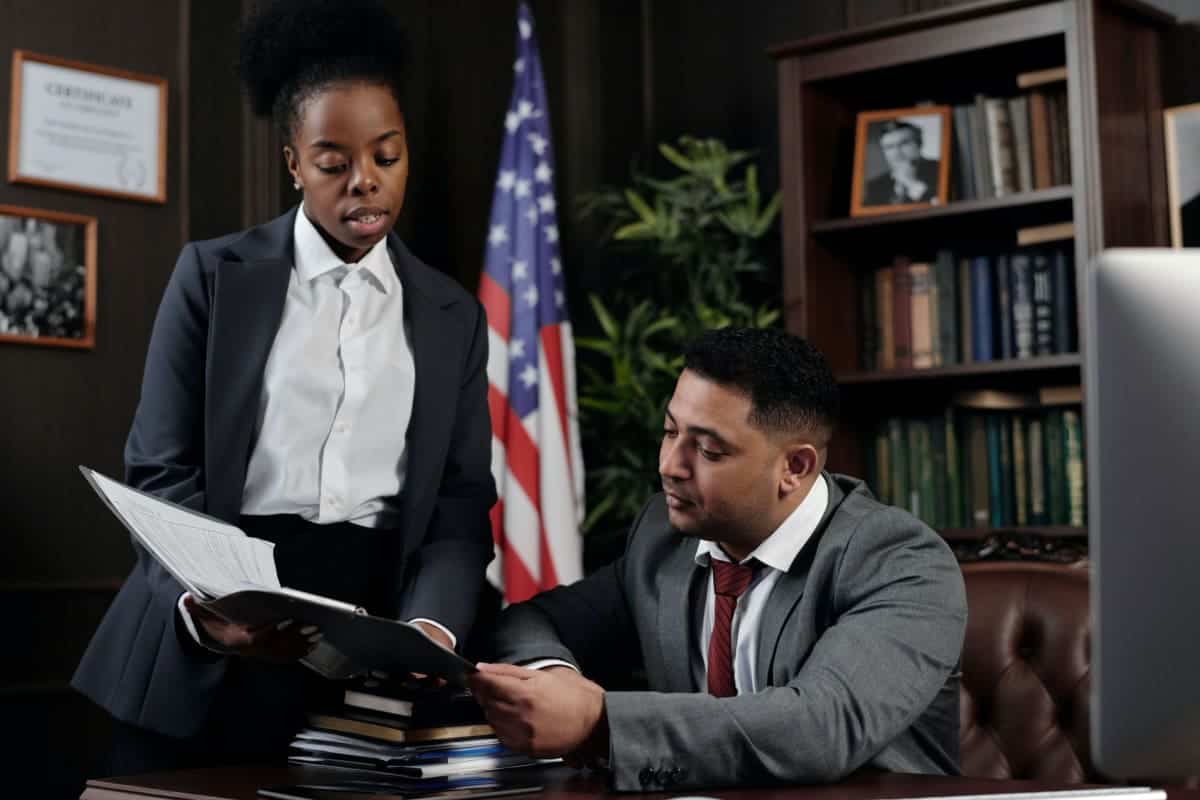Divorce can be a stressful and confusing time for everyone involved. Hiring a confident, experienced divorce lawyer is one of the best ways to minimize your worries, streamline the divorce process, and help you find the resolution you seek.
Divorce attorneys offer so much to individuals and families. They bring understanding and clarity to a season often defined by confusion and worry. They inform, educate, and provide resources to help you navigate this difficult time.

What Divorce Attorneys Bring to the Table
They represent you in a time of need and work hard to protect your interests and the well-being of you and your children. Here are just some of the many things a good family law attorney will help you both understand better and guide you through.
- Divorce proceedings
- Their particular approach to divorce
- The attorney-client relationship
- Contested divorce, uncontested divorce, collaborative divorce
- Divorce decree, divorce petition, dissolution of marriage
- Child custody
- Child support payments
- Parenting plans
- Parenting schedules, parenting time
- Primary caretaker
- Spousal support
- Walk-thru of divorce papers
- Property division: marital property, separate property, personal property
- What happens to the home and other real estate
- How divorce affects retirement accounts, bank accounts, marital debt, marital assets, credit cards, etc.
- The divorce settlement process and divorce judgments
- The tax consequences of divorce
- A breakdown of the average divorce costs
- The effect of divorce on a minor child
- Common divorce laws and rules
- Cost of litigation
- Average period of time for divorce
- Additional helpful resources and various family services
- and information on other divorce, marital, and family matters.
While divorce lawyers have a wealth of knowledge to offer, it’s important that you educate yourself, use discernment, and choose wisely when selecting an attorney to represent you and your family. With that in mind, we’ve compiled a list of 20 questions to ask when hiring a divorce attorney.
While there are many more important questions, this list should be a great start and help you make the right choice. Let’s look at these questions now.
1. How will we communicate with each other?
Phone, email, text, video conferencing…a combination of these? It’s important the two of you have an understanding of what methods are acceptable and encouraged for contact with one another.
2. How often will we communicate about my case?
Avoid an attorney who struggles to answer this question. You don’t want to have misunderstandings later on or additional charges you weren’t expecting. It will vary from client to client, but a good average is between 1 and 4 times per month.
3. How can I keep my communication with my spouse amicable?
Experienced divorce attorneys are adept at providing you with advice and the tools you need to communicate better with your spouse, to avoid undo conflict, share only necessary information, remain respectful, exchange the right information, and not say things that will be unfavorable to your case.
4. What parts of our conversations, if any, should I be sharing with my spouse?
Of course, you will communicate with your spouse about some aspects of your divorce. But it is important to remember that you do not need, and are not required, to share the specifics of the protected conversations between you and your attorney. These are private.
Your lawyer will discuss this with you in greater detail.
5. How many divorce cases have you handled?
It’s a good thing to know. You want someone with considerable experience, but it doesn’t need to be decades, as long as they have a solid case history and satisfied clients.
6. Will you provide references from previous clients?
The answer should always be yes. Additionally, the references they provide should be similar to your case. If you are dealing with a difficult, contested divorce, then references to easier, amicable divorces will not help you. Be sure they provide you with examples of happy clients with similar experiences to yours.
7. Do you prefer to negotiate and mediate or go to trial?
Going to trial usually means a lot more money. Trial is expensive and often a long, drawn-out affair. However, there are times when this is necessary. Just make sure you and your attorney are on the same page at each phase of the process.
8. Will you handle my case personally or hand it off to someone else in your firm?
Either answer is totally fine. However, it does matter that the two of you work well together. If you feel you have a good connection with a particular lawyer, you don’t want them passing your case off to someone else, especially if that individual doesn’t seem to have the same rapport with you.
Of course, the possibility exists that someone else might even work better. Find out how the process works in their firm, ask questions, and let them know what you’d like. Find out all your options and work with them to create the best working scenario for the two of you.

9. What is your caseload like?
Ideally, you sort of want a balance. If they’re juggling 50 cases at once, they may not be able to provide you with the attention you need. On the flip-side, if they’ve got no other cases, that might be a red flag to look out for.
10. How much will you charge me?
This, of course, is always top-of-mind when discussing your case. They should provide you with their retainer fee and hourly rate. Also, be sure to ask them about any possible additional fees for other associates they may work with.
Their answers should be direct and clear. They rarely hesitate since they’ll want to know if you can actually afford their services. If they don’t bring it up, though, be ready to ask the question yourself.
11. What steps can I take to control costs?
Discuss their fees, additional costs peripheral to their services, unforeseen events or expenditures, and some things your spouse might do that will increase your costs.
Your attorney can neither predict all possibilities, nor can they give you exact amounts incurred because of surprise events or random behavior. Still, they should be able to give you a good idea of things that might affect your overall cost.
12. What is your strategy for my case?
It is unlikely that your attorney will have a complete strategy worked out during your initial consultation(s). They need time to put the information together, do the necessary research, and sometimes consult with others first.
However, they should be able to give you some general ideas of the direction they want to take for your case. Also, discuss your level of involvement in the process, and ask them if you will have the chance to approve their strategy before beginning.
13. Who should move out of the home, me or my spouse?
This is usually a personal decision that you and your spouse will need to discuss. In some situations, your lawyer may advise you one way or the other based on your current situation, the needs of your children, financial requirements, and especially in the event of domestic abuse, the possibility of false abuse accusations, or emotional and physical danger to the kids.
14. What parenting plan or child custody arrangement do you think will work best for me based upon what I’ve told you?
While this may change over time, depending on more complete information or new discoveries, your attorney will be able to educate you on all your parenting plan or custody options, and all related child custody guidelines for your state and county.
15. How much child support will I receive?/How much child support will I pay?
Your lawyer won’t be able to give you exact amounts if there are significant assets that need further research, something often requiring a forensic accountant.
Still, if your assets and those of your spouse are fairly straightforward, he or she should be able to give you a general idea using available software programs that calculate child support based on income, assets, and state requirements.
16. In my case, what is community property and separate property?
These definitions vary somewhat from state to state. Your attorney will have an idea of where certain assets fall gbut some will require more information and greater research.
They will also be able to explain how these determinations are made, what rules go into making this determination, and possible issues related to this subject.
17. Which issues in my case do you expect will be contested or more difficult to work out?
Of course, your attorney can’t predict your spouse’s behavior. Still, they will have an idea, based on the information you’ve provided, of the most likely trouble spots and larger obstacles you may face during your divorce.

18. How does your billing process work?
This ties into our earlier questions regarding costs. It’s a good idea to inquire about their billing habits. When it comes to fees or time spent beyond the reach of your retainer, how will they bill? Monthly? After the case is completed? Some other method?
19. Can you explain a typical divorce process to me?
Remember, every divorce is different, each one involving several variables that affect the particular strategies employed, the time required to negotiate and accomplish the legal goals, and any unforeseen events and choices.
Knowing this, your lawyer can still give you a picture of a typical divorce process like yours, explaining the necessary steps involved, what order they come in, and what you might be able to expect during this season.
20. How often do you reach an out-of-court settlement as opposed to going to trial?
Unfortunately, there are times when certain cases simply can’t avoid going to court and battling it out. This often happens in highly contested cases where a lot of assets are involved, or both parents want total custody of the children.
Your lawyer can give you an idea of how often each of these scenarios takes place and how to be prepared for both.
In Closing
There are many more questions you could ask your attorney. This list should get you started, though, and give you a bit of confidence and ease when discussing your case with a possible divorce lawyer.
Come prepared and engaged, but be willing to listen really well. A good lawyer will have years of knowledge and experience under their belt and have what it takes to inform, prepare, and advocate for you effectively during this difficult season.
Torrone Law helps individuals, and families navigate divorce and custody with confidence and peace of mind. We listen well, bring years of experience, and fight hard to protect your rights and your future.
Connect with us today to learn more about the many ways Torrone Law can protect and defend you and your loved ones.
To learn more about divorce, check out our frequently asked questions below.
FAQ
Is it okay to handle divorce without an attorney?
Well, it is an option. And if you have an incredibly easy, uncontested, and amicable relationship and agreement, the two of you can do so. However, most of the time, it is unwise to navigate divorce without representation.
Your attorney can uncover things you didn’t see and protect you, your children, and your assets if your spouse ends up not being as friendly and amicable as they once seemed.
What are some things I can learn from my divorce lawyer?
The list is long, but some things you will learn more about include:
- The division of assets
- The divorce process
- Court proceedings
- Custody
- Child support
- Spousal Support
- The cost of divorce
- Divorce Paperwork
- Different types of divorce
- Laws and rules surrounding divorce in your state and county
- and much more
If my spouse gets a lawyer, should I get one even if I feel I can’t afford it?
Money is a real concern for most of us. Quality legal representation can certainly add up over time. However, if your spouse hires an attorney, you may find yourself in real trouble if you don’t “lawyer up” as well.
Even if you need to take out a loan or find other funding sources, if you need to protect your kids, your assets, and your future well-being, an attorney is often your most vital line of defense.







